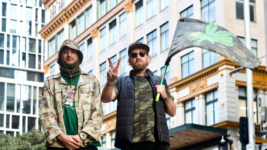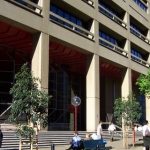Criminal Charges Against Cannabis Campaigners Dropped, Despite Police Attempts to Convict

Cannabis legalisation campaign Who Are We Hurting activists, Alec Zammit and Will Stolk projected dancing cannabis leaves onto the Sydney Opera House at 4.20 am on 20 April 2022, as a cheeky stunt, much like others they’ve conducted in the past, to draw attention to the cause.
And as the cannabis leaves continued hopping about on the building, NSW police stormed a room at Sydney’s Park Hyatt, where a device was projecting the entirely harmless demonstration, and the response by local authorities has been completely disproportionate in the wake of the crime.
For the fine-only offence of distributing advertising on Opera House premises, contrary to section 9(g) of the Sydney Opera House Trust By-Law 2021 (NSW), the pair spent two years on bail, despite neither having caused harm or threatened it toward anyone as part of their merry pranks.
Yet, while certain NSW police officers may become shrinking violets when legalising cannabis is raised, the fairly innocuous drug, as far as harms are concerned, is being made lawful in jurisdictions globally.
Indeed, it has been legal to possess a personal amount of cannabis in Canberra since January 2020.
And after police attempted to see the pranksters convicted last August, with a lack of evidence resulting in an adjournment, the prosecution dropped the charges without costs on 5 February. And the pair returned to court last Friday, as their lawyer successfully secured court costs.
Silencing the messengers
“We’ve prevailed in every legal challenge, however, the war on cannabis persists,” Who Are We Hurting campaign activist Zammit told SCL.
Represented by Sydney Criminal Lawyer’s James Clements, Zammit further outlined that he and Stolk, who was represented by Vinny Vijay from the same firm, had fronted up to the Downing Centre Local Court last Friday, as the lawyers secured legal costs against the New South Wales Police Force. Mr Zammit underscored that the toll for him and his partner in crime weren’t just financial.
Zammit explained last August, that he and Stolk have long been employing guerrilla theatre tactics to raise awareness regarding the mis- and disinformation used to demonise a plant that when used is much less harmful than alcohol or tobacco.
The stunts the pair of artists have pulled off in the past have including setting up a fake grow house in a shop front in Kings Cross in 2017, as well as having set up a huge cannabis Christmas tree in Martin Place, in an attempt to make that festive season all the merrier.
According to Zammit, the police have gone so hard on the dynamic duo, as a “tactic to suppress us and drain our bank accounts”.
However, the activist was pleased to see that it would actually be NSW police now footing the bill.
Full of holes
On providing representation last August, senior SCL associate Clements queried why such a high-ranking NSW police officer, as chief inspector Gary Coffey, was even involved in a case regarding a fine-only offence.
And the lawyer required Coffey to be present in court for the 29 August proceedings, with NSW police threatening SCL with an application for costs for his presence.
Yet, the law firm responded that if police didn’t want such a high-ranking officer to attend, then it shouldn’t have them bring the charges.
Clements raised further matters with the court, including why it was solely Zammit and Stolk, who’d been charged over the incident, when there were two women in the hotel with them during the raid, and he also suggested Coffey used threats to procure pleas of guilt.
Due to the lawyer’s line of argument, NSW Magistrate Daniel Reiss then adjourned the matter last August, in order to provide Coffey with more time to build a case. However, the prosecution went on to drop the charges officially in court last Friday, as it wasn’t able to present one.
And the SCL lawyer then successfully secured costs, with both Zammit and Stolk being awarded $2,750 each.
A global trend
NSW Legalise Cannabis MLC Jeremy Buckingham was at the Downing Centre last Friday, to support the pro-cannabis duo. And the member of parliament has even accompanied the pair in the past, when the three of them drove tanks across the Sydney Harbour Bridge calling for legal cannabis.
Buckingham underscored the need for drug law reform in this state, especially when it comes to the commonsense proposal of legalising the revered herb, as well as raising the matter of biased drug driving laws that continue to penalise drivers for using legal medicinal cannabis when unimpaired.
Unlike random breath testing for alcohol, which tests for levels in a driver’s blood and hence, being too intoxicated to drive a car, NSW drug driving laws ascertain whether there are any traces of cannabis in a driver’s system, meaning they can lose their license over a joint smoked days prior.
But while the NSW police persist in arresting people who are not driving under the influence of cannabis, they’re also continuing to raid illegal cannabis plantations and arrest more people over cannabis consumption charges than any other type of drug offence on the books.
The unlawfulness of cannabis in NSW continues, after 24 US states and the US capital have legalised it, along with the entire nations of Canada, Uruguay and Malta, whilst in South Africa and Mexico, the highest courts in the land ruled that penalising homegrow and use is unconstitutional.
Although looking beyond this country when raising the cause of cannabis legalisation is no longer necessary, as in the Australian Capital Territory, civilians have been able to possess up to 50 grams of cannabis for personal use and to grow two plants at home lawfully, for the last four years.
And this is what Zammit and Stolk are talking about.
“We also wish to see a thriving legal cannabis industry in Australia that includes adult use and medical, all working in a symbiotic union,” Stolk succinctly put it last week. “The annual taxes from this would be in the billions and in a post-COVID world, we need all the money we can get.”
“It’s a no-brainer really, and we need these short-sighted politicians to see and then act on this.”







